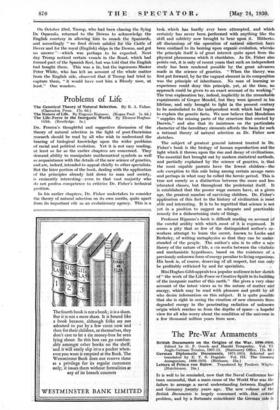Problems of Life
Da. FistrEit's thoughtful and suggestive discussion of the theory of natural selection in the light of post-Darwinian research should be read by all who wish to understand the bearing of biological knowledge upon the wider problems of racial and political evolution. Yet it is not easy reading, at least so far as the earlier chapters are concerned. They demand ability to manipulate mathematical symbols as well as acquaintance with the details of the new science of genetics, and are, indeed, intended to appeal chiefly to other specialists. But the later portion of the book, dealing with the application of the principles already: laid down to man and society, is eminently interesting—even to that vast majority who do not profess competence to criticize Dr. Fisher's technical position.
In his earlier chapters, Dr. Fisher undertakes to consider the theory of natural selection on its own merits, quite apart from its important role as an evolutionary agency. This is a task-. which has hardly ever been attempted, and which certainly has never been, performed with anything like the skill and subtlety now brought to bear upon _it. Hitherto,
iussions of the operation of natural Selection. have been confined. to its bearing upon organie evolution, whereas the principle itself is of great interest quite apart from the physical phenomena which it elucidates. As Dr. Fisher also points out, it is only of recent years that such an independent study has been rendered possible by the great advances made in the science of genetics. " When the theory, was first put forward, by far the vaguest element in its composition was the principle of inheritance. No man of learning or experience could deny this principle, yet, at the time, no approach could be given to an exact account of its working." The true explanation lay, indeed, implicitly in the remarkable experiments of Gregor Mendel, but they were ignored in his lifetime; and only brought to light in the present century to be assimilated tothe independent work which had begun to explain the genetic facts. We now believe that Bfendelism " supplies the missing parts of the structure first erected by Darwin," and also that its insistence on the particulate character of the hereditary elements affords the basis, for such a rational theory. of natural selection as Dr. Fisher now sketches.
The subject of greatest general interest treated in Dr. Fisher's book is the biology of human reproduction and the light which it throws upon the rise and decay of civilizations. The essential fact brought out by modern statistical methods, and partially ekplained by the science of genetics, is that the most capable parents have the fewest childien—the sole exception to- this rule being among certain savage races and perhaps in what may be called the heroic period: This is true not merely as a distinction between the more and less educated classes, but throughout the proletariat itself. It is established that the poorer wage earners have, at a given age, the greatest:number of surviving children. Dr. Fishers application of this fact to the history of civilization is most • able and interesting. It is to be regretted that science is not yet in a position to suggest an adequate and practicable remedy for -a disheartening state of things.
Professor Rignano's book is difficult reading on _account of the careful aridity with which ,most of it is expressed. It seems a pity that so few of the distinguished author's co- Workers attempt to learn' the ;secret, known to Locke and Berkeley, of writing metaphysics so that they can be und4r- standed of the people. The author's aim is to offer a niw theory of the nature of life, a ria media between the vitalistic and mechanistic hypotheses, based on the existence of:a previously unknown form of energy peculiar to living organisms. His book is, of course, deserving of all respect, but can only be profitably criticized by and for specialists.
Misi Hughes-Gibb appeals to a popular audience in her sketih 'of " the work of the Life:Force or Creative Spirit in its buildifig Of the inorganic matter of this earth." She gives a very clear account of the latest views as to the nature of matter and energy, which may be read with pleasure and profit- by alt who desire information on this: subject. It is quite possible that she is right in seeing the creation of new elements from degraded energy in the penetrating radiation of unknoWn 'origin which reaches us from the depths of space—a hopeful view for all who worry about the condition of the universe in a few thousand million years from now.






































 Previous page
Previous page